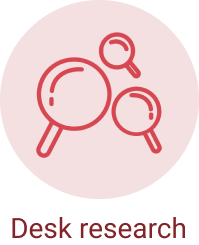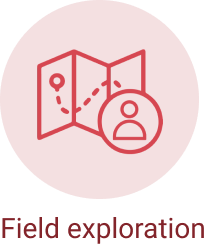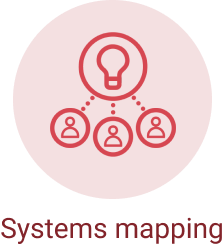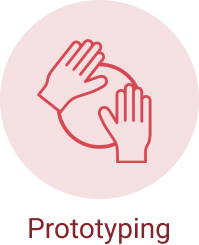Ladder
A social action-focused service design project that encourages social mobility for the 16+ youth in Camden.
Year: 2023
Role: Service Design Researcher & Workshop Facilitator
Client: Somers Town, The Living Centre is a community association offering health and wellbeing services to the Somers Town Community, where local people help to co-design, deliver, and use projects that tackle their own health, wellbeing, economic, and social issues. The Job Hub, part of The Somers Town Living Centre, offers customized, expert advice to Camden residents seeking support with employment, training, and volunteering opportunities.
This project, commissioned by Somers Town's The Living Centre, aims to address EPQ qualification requirements and tailor these requirements to meet the specific needs and conditions of minority groups. Conducted as part of the MA Service Design program at UAL, the research and interventions involve workshops, observations, and testing with the residents of Somers Town.
EPQ: Extended Project Qualification (EPQ) is a qualification taken by some students in England and Wales, which is equivalent to 50% of an A-Level.






How Might We
empower the Somers Town community through a social action-based EPQ to increase their social mobility and community participation?
Discover: Initial Research
Secondary Research Results:
Camden Town and Somers Town
Define: Analyzed Community Groups (Personas) and Needs
Non-Native
The non-native group is one of the least resilient in Camden Town. Their cross-country untransferable skill sets and language barriers leave them in a vulnerable position.
To become more resilient, they need:
Skill definition
CV building and application guidance
Interview skills
Networking
Language-independent paths
Opportunity Seeker
This group primarily includes start-up owners who lack support or capital, as well as skilled workers such as woodworkers, tailors, wall/mural painters etc.
To receive more support, they need:
Unconventional education paths
Collaboration and team building
Networking
Funding
Leadership skills
Care-Giver
Caregivers are another of the least resilient groups in Camden Town. They are occupied during the day and often have no or very limited income.
To increase their social mobility they need:
Unconventional education paths
Skill definition
Networking
Funding
Flexible working hours
Discovery Workshops 1 & 2
Discovering Interests and Skills (20 mins)
In this activity, participants were guided through prompts to explore their interests and skills by re-evaluating their day-to-day lives.
Facilitators then assisted participants in matching their daily life moments with prepared tags and skill cards to identify their areas of strength. The final step aimed to uncover the participants’ future visions and goals.
Workshop Outcomes
The participants showed great interest in the EPQ and the workshop format. The discovery workshop effectively helped them recognize their strengths and skill sets, while the goals and barriers map prompted them to consider the obstacles and needs they face in achieving their visions. By the end of the workshop, participants had a preliminary understanding of the EPQ, with some expressing interest in joining the course.
We found that the participants' main motivations were to improve themselves, contribute to the community, and enhance their quality of life. The primary barriers they faced included a lack of time, money, confidence, knowledge, language barrier and relevant skills.
Goals & Barriers Map (15 mins)
The participants were prompted to write down their current status or where they were in their professional journey, followed by their goals, barriers, and needs.
The participants were supported by written examples to give them the space to connect with others. They also discussed it within their small groups, to encourage the awareness of shared obstacles.
Key Learnings
There is a demand for EPQ as a tool for social action
Participants are open to reflect, receive guidance and have conversations
Divergence & Develop: Cross-Team Data Sharing
Based on the findings from the workshops, the project took
a new direction by combining collected data with another service design research team focused on +16 youth EPQ qualification seekers and their needs. We noticed overlapping needs and complementary skills between the two groups, prompting us to combine and engage both groups to foster mutual social mobility.
Analyzed data and extracted insights about the +16 youth ➔
Ideation & Solution Building: Potential Gazing
Low-resilience individuals can be trained by current Somers Town activists and community gatekeepers who are already working to involve youth in social and community causes. This social action can be documented and submitted as a Reflective Volunteering Journey on EPQ applications. This approach benefits +16 youth by involving them in the community, keeping them away from harmful paths, and providing education and support from the Somers Town community and its citizens.
Develop: System Mapping
The EPQ can help learners to make a difference in their communities while helping to provide a route into employment, particularly for those who have not previously worked or who are looking to return to work after a significant period of not working. They can learn transferable skills highly valued by employers, improve their CV, gain access to mentors, and build up the confidence to deliver projects.
The EPQ can help those from non-traditional educational backgrounds into higher education. It awards half the UCAS points associated with an A Level, and it has been recognised by University of the Arts London and Goldsmith’s as a route into their undergraduate courses. The independent learning component and the academic skills acquired in the taught component of the EPQ provide a boost for accessing higher education.
Deliver: Curriculum
As the learners complete the course, we expect them to acquire and demonstrate the study and design skills introduced throughout the curriculum. The learners will be able to use those skills to plan, research, prototype and execute their project of choice.
These skills, together with their evidence, will provide the learner with a substantial benefit when they are seeking opportunities in higher education, as well as give them transferable skills in project management, evidencing, and design, that they will be able to utilise in their careers. Additionally, as the projects will be conducted within the community, they will be able to develop a network which will further embed them in the community life.
The mentoring organisations, on the other hand, will benefit from having an engaged person looking at their activities in a new way and creating pathways for improvement.

















